|
|
|
Sort Order |
|
|
|
Items / Page
|
|
|
|
|
|
|
| Srl | Item |
| 1 |
ID:
115225
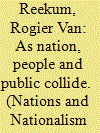

|
|
|
|
|
| Publication |
2012.
|
| Summary/Abstract |
In recent decades, Dutchness has become an intensely debated issue in Dutch public sphere. The article problematises the labelling of nations and nationalisms that occurs in public and academic understandings of these developments. Craig Calhoun's concept of discursive formation is argued to be more fruitful for understanding the recent contestations over Dutchness. Yet Calhoun's theory is itself in need of elaboration. Whereas Calhoun proposes to focus on the extent to which nations are constructed as publics of highly differentiated members, it is precisely this image that is central to an exclusionary discourse of Dutchness and enables the exclusion of cultural others from the Dutch imaginary. By analysing the enactment of Dutchness through discourses on citizenship, the surprising congruence of pluralism and exclusion in the Dutch context is explored.
|
|
|
|
|
|
|
|
|
|
|
|
|
|
|
|
| 2 |
ID:
115229


|
|
|
|
|
| Publication |
2012.
|
| Summary/Abstract |
In this article, analysis focuses on the websites of Greek-American diaspora organisations. The aim is to study these media outlets on two levels: (1) with regard to their communication function(s), in order to understand the spectrum of usages they offer to their visitors; and (2) with regard to the way they signify identity specificity at the crossroads of a parallel ethnic or national adherence. The low interactivity constitutes one of the general features of the media analysed. The persistence of the nation as the framework to apprehend collective belonging and the interaction with the 'other' is another recurrent and important element. The 'identity specificity' of the Greek diaspora community is not presented in articulation to the host society, but in terms of a continuous attachment to a 'mother-nation', as a historic and cultural entity. The nationhood claimed and promoted in this manner is ethnic and cultural, and it espouses the form of an ecumenical and transcendent Hellenism.
|
|
|
|
|
|
|
|
|
|
|
|
|
|
|
|
| 3 |
ID:
115230
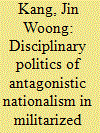

|
|
|
|
|
| Publication |
2012.
|
| Summary/Abstract |
After the Korean War (1950-53), the two militarized Koreas governed each and every member of society in similar ways through their disciplinary politics of antagonistic nationalism. The existing studies of state formation in the two Koreas have neglected an aspect of state power that was neither necessarily top-down nor violent from above but also reproduced from below. In both South and North Korea, especially from the 1960s to the 1970s, state power had internal dynamics that penetrated the day-to-day activities of most citizens and led them to actively accept and participate in nationalist rule. This article explores an understudied aspect of the two Koreas' state power that was disciplinarily diffused in people's everyday practices through reproduction of aggressive nationalism from below and the organic construction of the individual body and nation.
|
|
|
|
|
|
|
|
|
|
|
|
|
|
|
|
| 4 |
ID:
115228
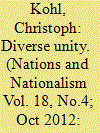

|
|
|
|
|
| Publication |
2012.
|
| Summary/Abstract |
The paper explores how creole categories of people who have constituted a small but influential minority in Guinea-Bissau for centuries contributed to a countrywide, integrated national culture since the eve of independence in 1974. Since independence, several cultural representations previously exclusive to creole communities have been - driven by the nationalist independence movement and the early postcolonial state - transformed into representations of a new national culture, crossing ethnic and religious boundaries. The fact that creole identity and culture had been transethnic - i.e. creole identity brings together individuals of heterogeneous cultural, ethnic and geographic descent - during the colonial period, has fostered in postcolonial times the countrywide spread of previously exclusively creole cultural features. I argue that this 'transethnicisation' of creole cultural representations has unified Bissau-Guineans across ethnic lines, causing a strong commitment with their nation 'from below'.
|
|
|
|
|
|
|
|
|
|
|
|
|
|
|
|
| 5 |
ID:
115226
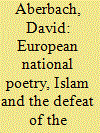

|
|
|
|
|
| Publication |
2012.
|
| Summary/Abstract |
The Muslim conquest of the Holy Land from Christendom, the invasion of southwestern Europe in the eighth century, and the Christian struggle, ultimately unsuccessful, to regain the Holy Land from Islam in the Crusades dominated European culture, particularly its poetry, for centuries. From the Old French epic, The Song of Roland (c. 1100) to the Albanian epic, The Highland Lute (early twentieth century), a vast popular culture grew in European vernacular languages in response to Muslim invasions and conquests. This article attempts to elucidate in panoramic form a neglected area of nationalism. It argues that from the medieval period until the fall of the Ottoman empire, poetry was instrumental in the rise of European national identities, partly in reaction to centuries of ascendancy of Islam, which undermined the authority of the Pope, the universal Church, the Gospel and Latin. The defeat of the medieval Church opened the way to narrower, more national and cultural concerns, reflected in a cluster of vernacular European poetic traditions.
|
|
|
|
|
|
|
|
|
|
|
|
|
|
|
|
| 6 |
ID:
115231
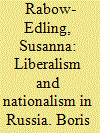

|
|
|
|
|
| Publication |
2012.
|
| Summary/Abstract |
This article investigates the link between nationalism and liberalism in Russia by looking at the way the leading spokesman of early Russian liberalism, Boris Chicherin, combined liberal ideas with notions of nation-building and the idea of the nation as a modernising phenomenon. The article argues that the young Chicherin, at least in the formative years of the 1850s, had an instrumental approach to liberalism. Liberalism served a specific purpose - to integrate the people and shape a community of active citizens so that Russia could modernise. Chicherin was concerned with the formation of a modern nation-state rather than the establishment of popular rule or political rights. In this sense, his thinking fits well into what, in the context of the Ottoman Empire, has been called modernist nationalism.
|
|
|
|
|
|
|
|
|
|
|
|
|
|
|
|
| 7 |
ID:
115232
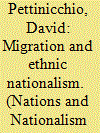

|
|
|
|
|
| Publication |
2012.
|
| Summary/Abstract |
This article explains the effects of ethnic nationalism on Anglophone and Francophone migration. The rise of Québec ethnic nationalism in the 1960s dismantled the cultural division of labour, which created new opportunities for Francophones but threatened Anglophones' traditional dominance over the Québec economy. This had negative consequences for Anglophones but positive outcomes for Francophones, which in turn accounts for differences in migration patterns. Drawing from the internal colony model as well as migration and exit-voice theories, and using ecological census data, micro-census data and election panel data, I find that the key variables that increase the likelihood of Anglophone out-migration either do not explain Francophone out-migration or have opposite effects. This is because ethnonationalist policies decreased the economic return particularly for well-educated, higher-earning, professional Anglophones in Québec, while increasing the economic position of Francophones and in particular well-educated professionals.
|
|
|
|
|
|
|
|
|
|
|
|
|
|
|
|
| 8 |
ID:
115224
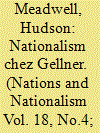

|
|
|
|
|
| Publication |
2012.
|
| Summary/Abstract |
The central distinguishing feature of Ernest Gellner's most important treatment of nationalism is the proposition that nationalism is necessary for industrial society. Relatively little attention has been paid to the philosophical dimension of this proposition. The question of necessity in social explanation, however, is a complicated philosophical problem and must be dealt with directly if this proposition is to be endorsed. I argue that Gellner's argument is philosophically flawed. The 'ordinary prose' of Nations and Nationalism fails to deliver what Gellner claims to have delivered: the demonstration of a necessary connection between nationalism and industrial society. This result is of particular relevance given Gellner's philosophical interests.
|
|
|
|
|
|
|
|
|
|
|
|
|
|
|
|
| 9 |
ID:
115227


|
|
|
|
|
| Publication |
2012.
|
| Summary/Abstract |
Relying heavily on the work of Edward Shils, this paper argues that a robust sense of national identity among the peoples of East Central Europe played a crucial role in the revolutions of 1989 and the subsequent emergence of civil society in the region's countries.
|
|
|
|
|
|
|
|
|
|
|
|
|
|
|
|
| 10 |
ID:
115233
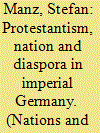

|
|
|
|
|
| Publication |
2012.
|
| Summary/Abstract |
This article examines the close connection between Protestantism and nationalism in Imperial Germany within a transnational context. In the years before 1914, the Prussian State Church in particular strengthened the legal and organisational framework for an increasing number of diaspora congregations to become attached. These acted as an important vehicle to embed the nationalist rhetoric produced within the Reich into emigrants' notions of belonging. Whilst previous scholarship has noted this connection in general, the article sheds more detailed light on the mechanics and structure, but also on the limits, of this process. Feedback processes from periphery to centre, in turn, had an impact on German national identity construction as that of a nation that was not confined to state borders. Applying a constructionist theoretical framework, the contested question of whether the heterogeneity of Germans abroad allows for the application of the diaspora concept is answered affirmatively.
|
|
|
|
|
|
|
|
|
|
|
|
|
|
|
|
|
|
|
|
|